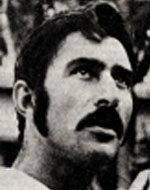Aviram (Abramovich), Eli (Elik)
Eli (Elik), son of Chaya and Jacob, was born on June 1, 1939, in Port Elizabeth, South Africa, and immigrated to Israel with his family in 1953. He attended elementary school in Port Elizabeth and then studied for one year at home – The joint book of the Jezreel Valley in Ein Harod-Ihud. Eli excelled at school in South Africa. He was a member of the “Scouts” movement in the city of Elisabeth, and even guided it. After immigrating to Israel, his family settled in Moshav Ramat Zvi, and after Eli stopped studying he helped his parents work in the farm. Eli was interested in all areas of science and technology and read many popular science booklets. He had inventions and introduced them both in his work and at home. He had “golden hands” and he was curious and inquisitive, and in his spare time he would dismantle complex mechanisms and assemble them. He wrote notes on practical matters and humorous notes in the Tel Yosef diary and composed stories for his daughters. Eli was kind and gentle, good-natured and humorous. Quiet, restrained and humble. He was complete with himself, responsible, punctual and very diligent, and he did his work honestly and loyally. According to Hever, Eli Eitan was on the ground of reality, but did not shut himself up and was wide-minded. Eli was drafted into the IDF in mid-May 1957 and volunteered for the Paratroopers Brigade After completing basic training and completing a parachuting course and a platoon commander course, he served in the Paratroopers Brigade as a medium-sized mortar. On his release certificate, Eli was mentioned as a “good and disciplined soldier.” After completing his regular service, he was assigned to reserve duty in the Artillery Corps, and after completing 120mm mortar rounds, he was sent to serve in the heavy mortars battalion as deputy commander of the team. Eli participated in the Six-Day War in battles in the north. Later, he took part in a departmental paramedics course and was appointed combat medic. He remained in his unit, but was placed in the medical corps. After completing his regular service, he studied for nine months in a course in Haifa to acquire a profession and went to work in the metal factory of Ein Harod-Ihud, where he traveled to Mexico, the United States and Canada, where he studied radio, television and electronics for two years. When he returned to Israel, he worked in the Navy in Haifa, and when he planted an orchard in Ramat Zvi, Eli was appointed to manage the orchard and in 1966 he married one of the daughters of Tel Yosef and joined the kibbutz. In Kibbutz Mishmar David, since his wife was studying nearby and he was an exemplary father and a model father, and when they returned to Tel Yosef, he came to work for me The radio laboratory at the metal factory of the kibbutz, and after a while decided to integrate into the metal factory and invested in it the best of its kind, a new factory was established there and Eli managed it with dedication and success. On the 16th of Tishrei 5740 (October 16, 1973), when the battalion provided artillery assistance at an amazing rate of fire near the village of Harfa, a malfunction was found in Eli’s half-track, and he completed another team, and after a few shots the mortar exploded and was killed. To rest in the Ramat-Zvi cemetery. He left behind a wife, two daughters (his third daughter was born after he fell and was named after him – Eilat), mother, brother and sister. After his fall, he was promoted to sergeant. In a letter of condolence to the bereaved family, the unit commander wrote: “He was very fond of his commanders and fighting friends.” His kibbutz, Tel Yosef, published a pamphlet in memory of his fallen soldiers in the war, in which Eli’s memory is also raised. The booklet includes the words of family members and friends about his character, as well as excerpts from his writings in the kibbutz diary and two stories he wrote to his daughters.
